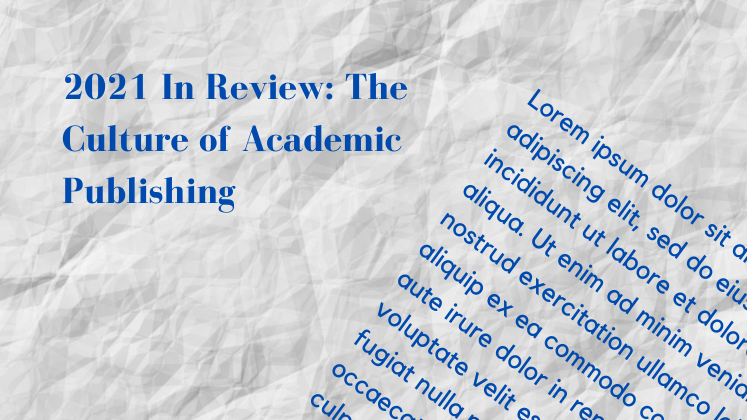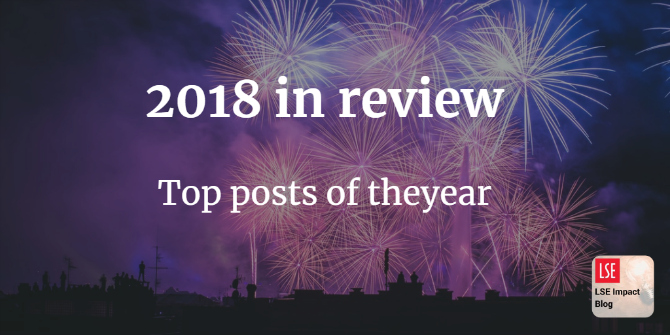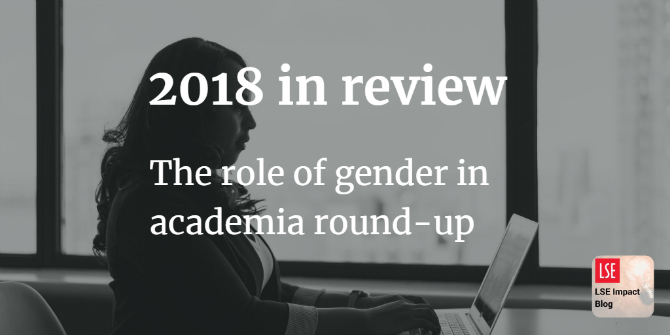2019 has seen the Impact Blog cover a wide range of subjects, from the increasingly urgent issue of the environmental impact of academic travel, to the more prosaic question of how to approach academic writing. This post brings together the ten most popular posts of 2019.
Academic travel culture is not only bad for the planet, it is also bad for the diversity and equity of research.
Responding to Jürgen Gerhards’ post on the ecological damage being done by excessive academic travel, Race MoChridhe observes how the financial and social burdens of academic travel add an additional barrier to participation in research and argues that if academia wants to address issues of diversity and equity in research, it must first acknowledge the effects of academic travel culture.
Beware the well-intentioned advice of unusually successful academics

 There is a wealth of advice and ‘how to’ guides available to academics on the subject of how research can have an impact on policy and practice. In this post Kathryn Oliver and Paul Cairney assess the value of this literature, arguing that unless researchers seek to situate research impact within processes of policymaking and academic knowledge production, this advice can ultimately reinforce current inequalities in research impact.
There is a wealth of advice and ‘how to’ guides available to academics on the subject of how research can have an impact on policy and practice. In this post Kathryn Oliver and Paul Cairney assess the value of this literature, arguing that unless researchers seek to situate research impact within processes of policymaking and academic knowledge production, this advice can ultimately reinforce current inequalities in research impact.
The “impact” of the Journal Impact Factor in the review, tenure, and promotion process


 The Journal Impact Factor (JIF) – a measure reflecting the average number of citations to recent articles published in a journal – has been widely critiqued as a measure of individual academic performance. However, it is unclear whether these criticisms and high profile declarations, such as DORA, have led to significant cultural change. In this post, Erin McKiernan, Juan Pablo Alperin and Alice Fleerackers present evidence from a recent study of review, promotion and tenure documents, showing the extent to which (JIF) remains embedded as a measure of success in the academic job market.
The Journal Impact Factor (JIF) – a measure reflecting the average number of citations to recent articles published in a journal – has been widely critiqued as a measure of individual academic performance. However, it is unclear whether these criticisms and high profile declarations, such as DORA, have led to significant cultural change. In this post, Erin McKiernan, Juan Pablo Alperin and Alice Fleerackers present evidence from a recent study of review, promotion and tenure documents, showing the extent to which (JIF) remains embedded as a measure of success in the academic job market.
Giving Credit: Gender and the hidden labour behind academic prestige

 In recent months, a number of high profile cases have focused attention on how credit is attributed to the creation of academic research and in particular the way in which the role of women is often diminished or effaced as part of this process. In this post Donica Belisle and Kiera Mitchell highlight the historical precedent of Mary Quayle Innis and the unrecognised impact she had on her husband Harold Adams Innis’ career and suggest that the social sciences and humanities would benefit from a wider interpretation of scholarly attribution than is currently practiced.
In recent months, a number of high profile cases have focused attention on how credit is attributed to the creation of academic research and in particular the way in which the role of women is often diminished or effaced as part of this process. In this post Donica Belisle and Kiera Mitchell highlight the historical precedent of Mary Quayle Innis and the unrecognised impact she had on her husband Harold Adams Innis’ career and suggest that the social sciences and humanities would benefit from a wider interpretation of scholarly attribution than is currently practiced.
A PhD is not just a degree – it is an opportunity to develop the skills needed to deliver impact
 Some PhD students and early career academics feel that the demands placed on them are so intense that they can never devote time to ‘secondary’ activities. Research comes first and last, and the doctorate ‘grind’ is something that has to be ‘got out of the way’ before they can focus on anything else. In contrast, Hayley Teasdale argues that PhD studies are an ideal time for developing your research communication and impact skills and growing your entrepreneurial and organizational capabilities.
Some PhD students and early career academics feel that the demands placed on them are so intense that they can never devote time to ‘secondary’ activities. Research comes first and last, and the doctorate ‘grind’ is something that has to be ‘got out of the way’ before they can focus on anything else. In contrast, Hayley Teasdale argues that PhD studies are an ideal time for developing your research communication and impact skills and growing your entrepreneurial and organizational capabilities.
Using Twitter as a data source: an overview of social media research tools (2019)
 Twitter and other social media platforms represent a large and largely untapped resource for social data and evidence. In this post, Wasim Ahmed updates his recurring series on the Impact Blog, to bring you the latest developments in digital methods and methodologies for researching Twitter and other social media platforms.
Twitter and other social media platforms represent a large and largely untapped resource for social data and evidence. In this post, Wasim Ahmed updates his recurring series on the Impact Blog, to bring you the latest developments in digital methods and methodologies for researching Twitter and other social media platforms.
Publication is not enough, to generate impact you need to campaign
 Being able to demonstrate the impacts of research outside of academia has become a standard requirement of a range of research funders. In this post, Toby Green draws on a recent case study of his own published research, to demonstrate how an approach to impact that regards publication as only one part of a long-term and cumulative communication campaign is integral to achieving impact, and argues that to do this engagement has to become a central feature of academic routines.
Being able to demonstrate the impacts of research outside of academia has become a standard requirement of a range of research funders. In this post, Toby Green draws on a recent case study of his own published research, to demonstrate how an approach to impact that regards publication as only one part of a long-term and cumulative communication campaign is integral to achieving impact, and argues that to do this engagement has to become a central feature of academic routines.
Do the best academics fly more?
 Academic flying is often justified on the basis that international conferences and travel are important to the production of new knowledge. As such, travel brings researchers into contact with new ideas, allows them to share and refine their own ideas and therefore improves the quality of their research. However, in this post Seth Wynes argues that beyond a certain level there is no clear relationship between the amount of travel undertaken by academics and the quality of their research in terms of productivity and the production of high quality papers: And, that as universities face increasing demands to reduce greenhouse emissions, they should look to ways to manage academic travel more efficiently and equitably.
Academic flying is often justified on the basis that international conferences and travel are important to the production of new knowledge. As such, travel brings researchers into contact with new ideas, allows them to share and refine their own ideas and therefore improves the quality of their research. However, in this post Seth Wynes argues that beyond a certain level there is no clear relationship between the amount of travel undertaken by academics and the quality of their research in terms of productivity and the production of high quality papers: And, that as universities face increasing demands to reduce greenhouse emissions, they should look to ways to manage academic travel more efficiently and equitably.
6 Insights into being a productive and happy academic author
 The advice given to academics, at any stage of their career, on how to be productive is often contradictory. Drawing on the findings of his previous post and a new survey of 593 academics, Chris Smith presents 6 key insights into productive academic behaviours and suggests the key to productivity lies in developing a system of writing that is tailored to your own writing style.
The advice given to academics, at any stage of their career, on how to be productive is often contradictory. Drawing on the findings of his previous post and a new survey of 593 academics, Chris Smith presents 6 key insights into productive academic behaviours and suggests the key to productivity lies in developing a system of writing that is tailored to your own writing style.
The death of the literature review and the rise of the dynamic knowledge map
 Almost every academic article starts with a literature review. However, although these short research summaries can be beneficial, as discussed in previous posts on the LSE Impact Blog, they also introduce opportunities for unverifiable misrepresentation and self-aggrandizement. In this post Gorgi Krlev proposes that short of abolishing them, or aiming for complete standardization of literature reviews, researchers in the social sciences and humanities should instead develop dynamic knowledge maps that can visually display the relationship between new research and the existing literature.
Almost every academic article starts with a literature review. However, although these short research summaries can be beneficial, as discussed in previous posts on the LSE Impact Blog, they also introduce opportunities for unverifiable misrepresentation and self-aggrandizement. In this post Gorgi Krlev proposes that short of abolishing them, or aiming for complete standardization of literature reviews, researchers in the social sciences and humanities should instead develop dynamic knowledge maps that can visually display the relationship between new research and the existing literature.
Note: This article gives the views of the authors, and not the position of the LSE Impact Blog, nor of the London School of Economics. Please review our comments policy if you have any concerns on posting a comment below.
Featured Image Credit adapted from Yuiizaa September, via Unsplash (CC0 1.0)









